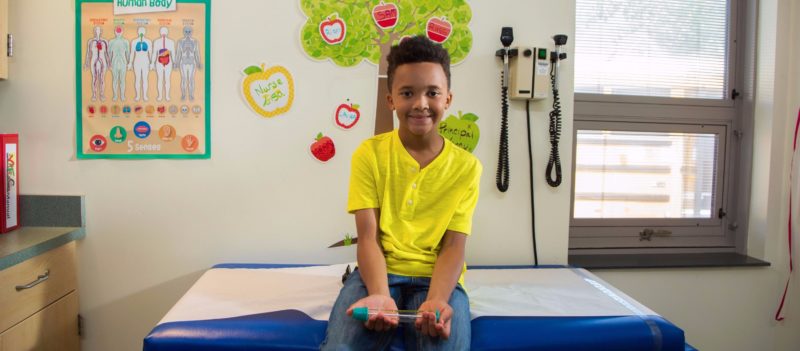Every big medical discovery starts with a big question. And asking those big questions is part of the Cincinnati Children’s culture.
Can we help the brain protect itself from injury in sports? Can we partner in communities and schools to help more kids with asthma get the treatment they need? Could proton therapy help kids with rare and difficult-to-treat cancers?
Our doctors and researchers have been working on these questions and have determined that the answers are all, yes!
With help from proton therapy patient Blake, asthma patient Wyatt and soccer athlete Julia, we have created three new videos that help tell stories of the impact research, innovation and collaboration can have on outcomes for kids.
You’ll begin to see these videos on TV during Reds games and online in various channels this week.
Here’s a sneak peek at each of the three videos:
About Proton Therapy: The Cincinnati Children’s Proton Therapy Center opened in August 2016. Proton therapy is an advanced radiation technology that allows us to target tumors in an extremely precise manner. Traditional radiotherapy is like a flashlight beam – it strikes both the cancerous cells and the surrounding healthy tissue. With proton therapy, the stream of proton particles targets only the cancerous cells and then stops. This allows us to deliver higher doses of cancer-killing energy more accurately, minimizing the risk of damaging healthy tissue. Learn more: Proton Therapy Treatment and Thoughts from Dr. John Perentesis about proton..
About Blake: When the Proton Therapy Center opened last year, Blake was one of the first patients to be treated. He completed treatments for a brain tumor in January. The day the video was filmed, his family and friends came to support him and be part of the action. The group hug at the end is all of Blake’s best buds and the hug was entirely unscripted – they are a really special group of kids!
About School-Based Asthma Programs: Approximately 25 million people in the United States have asthma, millions of them children. In some Cincinnati schools, as many as 1 in 5 children has this incredibly complex illness. To combat it, Cincinnati Children’s is collaborating with school administrators and nurses in an effort to keep kids out of the hospital. Doctors and nurses treat students on-site, helping them control their asthma, attend their classes and stay connected to the care they need to keep them healthy. Learn more about community-based asthma research efforts.
About Wyatt: Wyatt was 2 years old when he was diagnosed with asthma. He used daily inhalers to control his asthma symptoms and occasionally needed an emergency inhaler. Several times over the years, he needed treatment in the emergency department. Thanks to research, there are now better ways to control Wyatt’s asthma allowing him to play the sports he loves without worrying about an attack. He hasn’t needed an inhaler for almost a year! In the video, Wyatt races his sister Anna on the playground. Anna is also a Cincinnati Children’s patient and their family is part of our Champion’s program!
About Brain Injury Research: Properly designed and fitted helmets have long been the standard in brain injury prevention for athletes and daredevils. But Dr. Greg Myer and his collaborators were sure there must be a better way. Taking learnings from the anatomy of woodpeckers and bighorn sheep – both species that have regular repeated blows to the head without sustaining damage – the team set out to find a way to use blood volume to protect athletes’ brains from the inside, similar to the woodpeckers and sheep. Together with a company called Q30 Innovations, Dr. Myer and his team helped develop the Q-collar, which applies gentle pressure to the jugular veins, increasing the blood volume around the brain while the collar is being worn. The extra blood helps prevent the brain from colliding with the inside of the skull. Studies are suggesting that the collar has potential to be a game-changer.
About Julia: The star of this video is Julia, a sophomore soccer player at Seton High School. She and her teammates, as well as athletes on several other teams and in different sports, helped Cincinnati Children’s researchers study the Q-collar in action. The Seton women’s soccer team wore the collars during one season while the research team monitored the structures of their brains. Research participants like Julia – and all of the athletes who have helped test the Q-collar – make this type of clinical research possible!
Research is truly at the heart of everything we do at Cincinnati Children’s. By asking big questions, we find big answers. We then apply that learning to care here at Cincinnati Children’s and through collaborations and partnerships with researchers around the country and the world, we’re able to share our discoveries and further learn from theirs. Together.






These short videos were so sweetly giving answers to questions in the minds of those affected….keep up the great work!